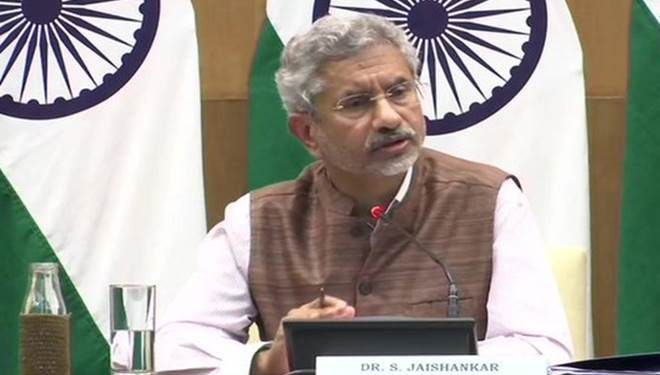Mumbai: Pakistan-occupied Kashmir (PoK) belongs to India, which expects to gain physical control over the region one day, external affairs minister S Jaishankar said Tuesday against the backdrop of heightened tensions with Pakistan on the Kashmir issue.
Terrorism is the only issue India is willing to discuss with Pakistan, and the world community understands that the changes made in Jammu & Kashmir are an internal matter and aimed at tackling issues such as cross-border terrorism, Jaishankar said, addressing his first news conference since assuming office to mark the first 100 days of the National Democratic Alliance’s (NDA) second term in government.
He also virtually ruled out meetings between Prime Minister Narendra Modi and his Pakistani counterpart Imran Khan on the margins of the upcoming UN General Assembly in New York.
“Our position on PoK is, has always been, and will always be, very clear — PoK is part of India and we expect one day that we will have the physical jurisdiction over it,” Jaishankar said.
India’s August 5 decision to nullify Article 370, the constitutional provision that gave special status to Jammu & Kashmir, and to split the state into two Union Territories triggered fresh tensions with Pakistan. India has rejected the Pakistani leadership’s contention that the issue could lead to a war, and New Delhi has said Islamabad is using the matter to support jihad and cross-border terrorism.
“With regard to Pakistan, the issue is not (Article) 370, the issue is Pakistan’s terrorism. There is no change really,” Jaishankar said, asking which country would accept a neighbour openly using terrorism as part of its foreign policy.
“What should come on the table first is the terrorism issue, because that is the root cause of the state of the relationship,” he added.
At the same time, Jaishankar virtually ruled out the possibility of a meeting with his Pakistani counterpart Shah Mahmood Qureshi on the margins of a South Asian Association for Regional Cooperation (Saarc) foreign ministers’ meeting in New York, as well as between Modi and Khan. Noting that Khan recently remarked that there was no point talking with India, Jaishankar said, “Part of the problem with Pakistan is it’s only been doing talking. It’s not been doing anything on terrorism. They think nice words are an answer to the real problem (which) is the dismantlement of this industry that they have created.”
Noting that Saarc was all about regional cooperation, which needs trade and connectivity and not terrorism, Jaishankar said: “If you were to look at the future of Saarc, which country is today actually promoting Saarc and which country is impeding Saarc? That is an issue which all of Saarc needs to reflect on and I’m pretty confident every other member knows what the answer to those questions are.”
The international community understood India’s objectives in modifying Article 370, and the government had the choice of continuing with policies of the past 30 years that hadn’t worked or “try to do things very differently and try to change the landscape and find more effective answers for a challenging situation”, he said.
Jaishankar was also dismissive of members of US Congress raising the Kashmir issue and alleged human rights violations, saying such matters were often raised by them because of lobbying by their constituents or others. He questioned whether members of Congress would be impassive about matters such as affirmative action, gender justice and universal application of laws, which is what the government hoped to achieve with its actions in Kashmir.
The international media, Jaishankar said, should take facts into account and not make “sweeping judgments on momentary impressions”. The minister said most issued related to the Kartarpur Corridor, which will connect Dera Baba Nanak in India with the gurdwara built at the site in Pakistan where Guru Nanak spent the last years of his life, had been resolved and both countries were “moving in the right direction”. Referring to New Delhi’s decision to accept consular access to Kulbhushan Jadhav, the Indian on death row in a Pakistani prison, despite conditions imposed by Islamabad, Jaishankar said India’s main objective was to seek access to him and to ascertain his well-being.
This was a step towards providing the remedy that was mandated by the International Court of Justice and India will continue trying to find a solution that “would bring an innocent person back to his country”, he said.






































